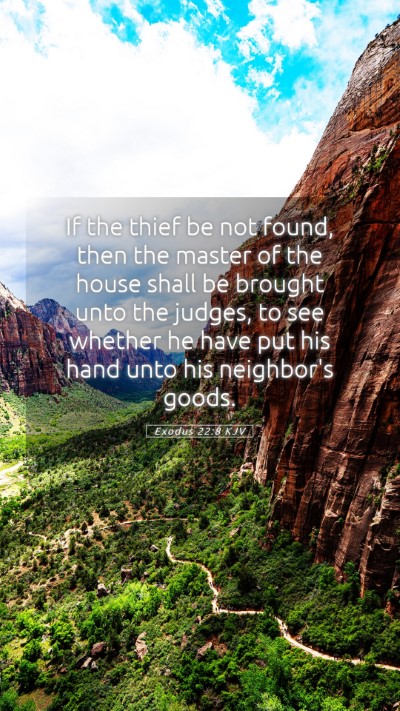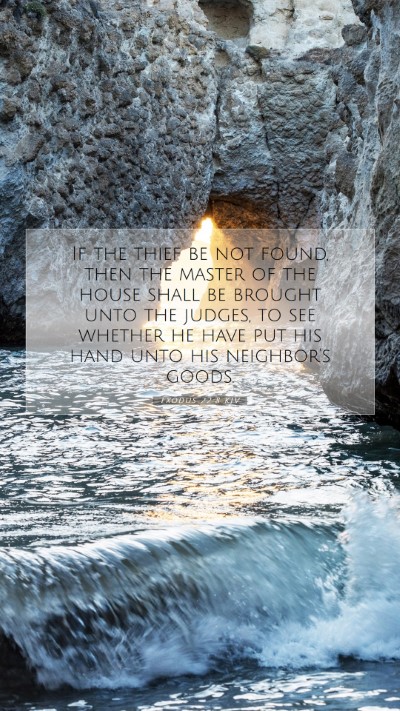Understanding Exodus 22:8
Bible Verse: Exodus 22:8
This verse falls within the broader context of the laws given to the Israelites after their exodus from Egypt. The specifics of this verse deal with issues of accountability and restitution in cases of theft or loss and reflect God’s administrative justice for His people.
Bible Verse Meaning and Interpretation
The verse reads: “If the thief be not found, then the master of the house shall be brought unto the judges, to see whether he have put his hand unto his neighbor’s goods.” This reveals several key insights:
- Judicial Process: The verse establishes a legal framework whereby disputes over theft must be resolved in front of a judge. This underscores the importance of a system of justice that is fair and equitable.
- Accountability: The master of the house is brought before the judges, highlighting that ownership carries responsibility. Owners must be transparent in their dealings and cannot take for granted that possessions are safe.
- Restitution Principle: This legislation reflects the principle of making amends. If the thief is not found, there is still a process in place to discern whether the loss was due to negligence on the part of the owner.
Commentary Insights
Matthew Henry points out that this particular law emphasizes the need for integrity and provides a mechanism for resolving disputes. In his view, it encourages individuals to take care of their possessions mindful of how they manage them and their responses to loss.
Albert Barnes highlights the moral aspect of this legislation, suggesting that it reinforces the community standard of ethics and responsibility towards one another. He elaborates that the judges act as mediators and ensure that all parties are treated justly.
Adam Clarke offers a deeper look into the text's implications in the context of ancient Israelite society. He explains that the call for judges indicates a structured legal approach, indicative of a society striving for righteousness and justice. Moreover, Clarke notes the communal implications of theft, as the act damages the social fabric that binds the Israelites together.
Theological Implications
This verse encourages believers to consider the broader implications of personal ownership and stewardship. It frames a theological understanding that everything belongs to God, prompting owners to act justly in their stewardship of possessions:
- Stewardship: Owners are held accountable for their assets, demonstrating that what they possess is ultimately a gift from God.
- Justice and Fairness: The process established for dealing with theft reflects God’s desire for justice among His people.
- Community Ethical Standards: The laws in Exodus extend beyond individual morality; they are designed for communal harmony.
Practical Applications
When contemplating how to apply this verse in daily life, individuals might explore:
- Restitution: When one has wronged another, there should be a willingness to make amends and seek resolution.
- Community Engagement: Understanding the importance of being part of a community that values ethics and justice.
- Daily Integrity: Striving to manage resources and personal conduct with transparency and accountability.
Cross References
Related scriptures include:
- Leviticus 24:18 - Emphasizing the principle of restitution.
- Deuteronomy 19:15 - Addressing the importance of witnesses in legal disputes.
- Proverbs 6:30-31 - Highlighting the moral implications of theft and the expectation of restitution.
Conclusion
Exodus 22:8 serves not only as a historical legal guideline for the Israelites but also as a timeless principle promoting justice, accountability, and community responsibility. Understanding this verse through various commentaries enriches one’s Bible study insights, facilitating deeper comprehension of Scripture and its application to modern life.
Final Thoughts: Whether in personal Bible study groups or through online Bible study resources, this verse exemplifies how God’s directives remain relevant, engaging believers in the practical aspects of their faith.


